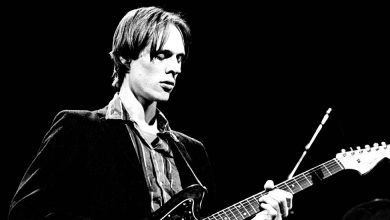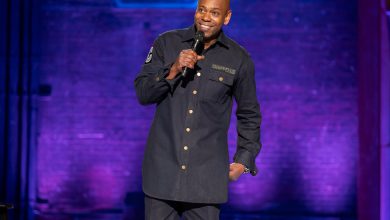Review: ‘Hangmen,’ Offering the Last Word in Gallows Humor

Welcome to Broadway’s fleurs-du-mal moment, a rare blossoming of funny plays on deeply unfunny subjects. At Circle in the Square, there’s “American Buffalo,” about creeping criminality; at the Friedman, “How I Learned to Drive,” about pedophilia; at Studio 54, “The Minutes,” about white triumphalism. In all of them, comedy is a top note, perfuming the odor of rot underneath.
But no fleur is as mal right now as the one that opened on Thursday at the Golden Theater: “Hangmen,” Martin McDonagh’s rip-roaringly hilarious yet profoundly horrific play about the abolition of capital punishment. Or rather its endurance. For in this deeply cynical tale, set in the final days of the death penalty in England, we see how “justified” murder, no longer state sanctioned, survives by other means.
Among those other means is Harry Wade (David Threlfall), the country’s second most famous executioner. We meet him, in a chilling prologue set in 1963, as he hangs a man named Hennessy, convicted of raping and killing a young woman. That Hennessy (Josh Goulding) goes to his death maintaining his innocence is neither here nor there to Harry, who sees his job as morally neutral. He merely wants to dispatch the man with dispatch — and does so in an unnerving coup de théâtre.
Threlfall’s titanic performance in this Royal Court Theater and Atlantic Theater Company production offers the most terrifying incarnation yet of the author’s acid misanthropy. Which is saying a lot after plays like “The Beauty Queen of Leenane” and “The Lieutenant of Inishmore” that portray the busy small-mindedness behind big ugly doings. His Harry is in some ways the flip side of Smike, the poor mangled wretch he played in “The Life & Adventures of Nicholas Nickleby” in the early 1980s. Harry, too, is Dickensian, but more like one of Dickens’s monstrous, red-eyed lawyers: He is cruel, peremptory and, with his dyed hair and prissy bow tie, dandyish in his self-regard.
The act of Parliament that suspended the death penalty in 1965 does not erase those traits. Most of the play takes place that year, after Harry has retired from public service to the pub he runs, with an executioner’s charm, near Manchester. There he still cuts an imposing if thin-skinned figure, bullying everyone in sight: Alice, his keeping-up-appearances wife (Tracie Bennett); Shirley, his 15-year-old daughter (Gaby French); and a bevy of barflies who together form a composite idiot.
But do not pity the poor hangman with no one to kill; his self-pity is more than sufficient. Despite his protests of “no comment,” it therefore takes very little coaxing for a cub reporter (Owen Campbell) to get him talking for an article timed to the second anniversary of Hennessy’s execution. Out it all pours: the vainglory, the moral equivocation and especially the furious envy of “Albert bloody Pierrepoint,” the “Number One hangman all them years,” with hundreds more executions to his credit.
Somehow McDonagh sets these instigating events in motion and assembles the core characters without your even noticing the structural work going on. But now he plays two wild cards. One is a character we met in the opening scene but who returns unexpectedly: Syd (Andy Nyman), Harry’s mousy and possibly pervy former assistant. Syd, too, burns with suppressed fury, Harry having ratted him out for some minor peccadilloes involving other people’s genitals.
The other is the menacing Mooney (Alfie Allen), a “spiffy young devil” (as Ben Brantley called the character in his review of the 2018 Atlantic production) and an obvious outsider with his mod clothes and inscrutable Oxbridge palaver. In Allen’s convincingly reptilian performance, Mooney is an anarchic force, deliberately jangling everyone’s nerves with non sequiturs and contradictions that invite an effort to pin him down. Is he a sociopath or merely an entitled toff?
But he is un-pin-down-able, making short work of those who try. When a suspicious detective named Fry (Jeremy Crutchley) does his best to scare him off, it goes nowhere:
Shirley, whose own mother calls her “moody on the inside and mopey on the outside,” knows this makes no sense but likes Mooney anyway and soon goes missing.
Having built its gallows, the play proceeds to hang someone on it. Or perhaps several people, for there is at least mild comeuppance all around. If Harry’s attempts to promote a glorious history instead of his true one are thwarted, so too are almost everyone else’s delusional hopes. Only the cronies come out ahead, having netted for their troubles some free beer and a lot of excitement.
Which makes the audience another crony, with beer available at the theater bar. And in Matthew Dunster’s whirlwind production, we certainly get a lot of excitement, even if it’s the sickly kind laced with danger. (The fight direction, by J. David Brimmer, is superb.) Dunster also extracts every possible laugh from each dour situation; even as Hennessy resists the noose in mortal terror, Syd tells him, “If you’d’ve just tried to relax you could’ve been dead by now.”
Logic, for these characters, is a backward-flowing sewer, and ethics, likewise, are useful only to the extent they can be inverted into excuses for bad behavior. That Harry is loosely based on Harry Allen, England’s actual last executioner, a man who was indeed less famous than the real Albert Pierrepoint, suggests the play’s diagnosis of the human propensity toward violence and revenge is neither fictional nor narrow; there’s a reason the title is “Hangmen,” plural.
This is bracing, yet something nevertheless bothered me about the play, even aside from a few logical holes and untied knots, when I saw it downtown. Though, like most of McDonagh’s earlier work, it trades in the comedy of human pride in awfulness — a bottomless resource — the contrast between its profoundly serious subject and its baroque construction is more unsettling here than usual. Something about a hanging (let alone two) is hard to let go of, and if you laugh as much as I did at “Hangmen,” you may later find yourself asking whatever for.
That this feeling of disproportion is fainter in the Broadway production than in 2018 may provide a clue to the answer. The cast, with just four holdovers, is certainly better tuned now, and Threlfall makes a big difference. Also successfully amped up for Broadway are the sinister sets and pinpoint costumes by Anna Fleischle.
But it’s more than that. Four years later, the world feels coarser — perhaps it always does — and not just because death has become much more visible in streets and wards and wars. So has people’s indifference to it, and to all kinds of suffering and unfairness. McDonagh’s cynicism feels closer to our own, or rather we to it. “Hangmen” now plays less like a clever exercise and more like news, with an unnerving headline. Garden-variety amorality is not a far throw from violent psychopathology, it reports, or for that matter from what we call justice.
Hangmen
Through June 18 at the Golden Theater, Manhattan; hangmenbroadway.com. Running time: 2 hours 20 minutes.





